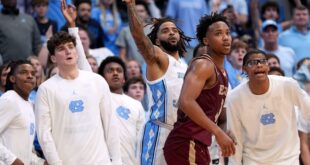Even now, after all these years, Norman Siegel is conflicted. He was born in Brooklyn, raised in Brooklyn, and he firmly believes his childhood passion for the Brooklyn Dodgers set him on a course to becoming a civil rights attorney.
Now it’s the Los Angeles Dodgers who’ll be playing the New York Yankees in Game 1 of the World Series Friday night, this after knocking off the Mets in the National League Championship Series. And it so happens that Siegel, who turns 81 in November, transferred his loyalties to the expansion Mets in 1962, five years after the Dodgers moved to the west coast.
Should a loyal Mets fan root for the Yankees in the World Series? On the other hand, how can a native of Brooklyn root for the team that abandoned Ebbets Field?
This will be the 12th time the Dodgers and Yankees have met in the World Series, and it’s the fifth meeting since the Dodgers relocated to Los Angeles. To gain some perspective that can only be provided by a true Brooklynite, I spoke with Siegel. I spoke with Abby Tedesco, 90, who participated in the big celebration in front of the Hotel Bossert on Montague Street that October afternoon in 1955 when the Brooklyn Dodgers toppled the Yankees in Game 7 of the World Series for their only pre-Los Angeles championship. I spoke with Shaine Kay, age 51. Not yet born when the Dodgers moved away, even he has feelings on the matter.
Norman Siegel had sports in his blood. His father, Benjamin Siegel, had played some semi-pro basketball back in the day, and he was a hearty Dodgers fan. Benjamin Siegel was a union foreman for Supreme Printing Co., on Varick Street in Greenwich Village, which meant daily trips into Manhattan, but he still found time for trips to Ebbets Field, often with Norman at his side.
Norman Siegel was a fine student at New Utrecht High School and later at Brooklyn College and NYU School of Law, but it’s nothing compared with the education he received at Ebbets Field. Going to Brooklyn Dodgers games, he said, “sensitized me to the concept of racial equality, which led me to become a civil rights lawyer. And I’ve been doing that now for 54 years.
“Ebbets Field was my first exposure to people who were Black in significant number,” Siegel said. “Sitting with Black people in the bleachers helped make me be comfortable rooting for a team that was racially mixed.”
The Dodgers made history in 1947 when their general manager, Branch Rickey, broke baseball’s longstanding color line by promoting Jackie Robinson to the big leagues. Soon other Black players would come along. Roy Campanella. Don Newcombe. Joe Black. Siegel saw all of them.
“For 75 cents you could sit in the bleachers,” Siegel said. “We didn’t high-five anyone in those days, but whenever anyone on the Dodgers did something, whether it was Jackie or Pee Wee Reese or Duke Snider, we’d get up and applaud. Sometimes I would look at the other people, they were Black and White. So whether it was Preacher Roe or Don Newcombe pitching, we usually had four Whites and five Blacks or five Blacks and four Whites, or something like that, but we were all together. It was we shall overcome.”
“I celebrated in ’55, of course, when we finally beat those damn Yankees,” Siegel said. “And I was devastated in ’57.”

Norman Siegel with a photo of several Brooklyn Dodgers greats (Courtesy photo)
With his law degree, and with what he learned growing up at Ebbets Field, Siegel went south to work for the ACLU’s Voting Rights Project. In 1985 he was named executive director of the New York Civil Liberties Union. Now living in the Upper West Side in Manhattan, he’s on the board of directors of the Jackie Robinson Foundation. He is a New Yorker, through and through, and the Dodgers have now been Los Angeles’ team for almost seven decades.
So … Dodgers or Yankees in the World Series?
“People have been asking me what I’m going to do,” Siegel said. “I’ll know for sure when the the first game starts.
“But when I see that uniform, with ‘Dodgers’ across the front, it wins me over.”
Abby Tedesco has no conflicts about which team she plans to support in the World Series.
It’ll be the Dodgers.
It’s a Brooklyn thing.
Abby is living in Lido Beach on Long Island now and has a summer place in the Berkshires where her family runs an animal sanctuary, but to talk to this spry, upbeat woman about growing up in East Flatbush is to talk about those many happy treks to Ebbets Field to watch the Dodgers.
Abby’s biggest takeaways? She especially enjoyed the slaphappy band of Ebbets Field musicians known as the “Dodgers Sym-Phony,” and as a youngster she’d marvel as the volume of peanut shells that collected on the ground during the game. “We’d be eating peanuts all day, and what a mess we’d leave,” Abby said. “I don’t know how they got them all picked up.”

Abby Tedesco with a photo of the memorable 1955 Dodgers. (Courtesy photo)
But it was Abby’s father, Moe Moskowitz, who wore the Dodger pants in the house. “He wasn’t just a Dodger fan, he was a crazy Dodger fan,” Abby said. “If he was watching a game the Dodgers could have an 8-0 lead in the eighth inning and he’d be saying, ‘It’s too close! It’s too close!’ Sometimes he’d get so nervous he’d turn the game off and read about it in the paper in the morning.”
Moe Moskowitz was in ladies’ corsets. “My father managed a chain of 15 stores owned by my uncle,” Abby said. “The company was called Corsetorium. They used to say, ‘Of course it’s Corsetorium!’”
Dashing about from corset shop to corset shop kept Moe busy, but not too busy to take the family to Dodgers games. The family home at East 54th Street and Lenox Road was only a couple of miles from Ebbets Field.
“Jackie Robinson lived not too far from where we lived,” Abby said. “My father would pile all the kids in the car and we would drive past there all the time to see if we could spot him out front and wave hello. We never did see him, but we’d keep going.”
When the Dodgers toppled the Yankees in the 1955 World Series, Moe again piled all the kids in the car. This time the destination was the Hotel Bossert.
“He knew the Dodgers would be celebrating there, and he wanted us to be part of it,” Abby said. “And we just stood there, watching everyone come in and out of the hotel. That was exciting.”
What wasn’t so exciting in the Moskowitz house was what happened two years later, when the Dodgers announced the move to Los Angeles. Moe was all worked up — even more so than if the Dodgers had an 8-0 lead in the eighth inning — but he got over it. “He went from being a crazy Dodgers fan to being a crazy Mets fan,” Abby said.
Moe Moskowitz passed away in 1992. He lived to see the Mets win two World Series championships, twice as many as were won by the Brooklyn Dodgers.
Abby isn’t as big a baseball fan as her father was, but, yes, she rooted for the Mets to beat the Dodgers in the NLCS.
She’ll be rooting for the Dodgers — the Los Angeles Dodgers — to beat the Yankees in the World Series.
“Even though they beat us, I want them to beat those damn Yankees,” Abby said.
And then there’s Brooklyn native Shaine Kay, too young to have even stepped inside Ebbets Field. Moreover, he admits he hasn’t been much of a baseball fan “since I was little.” And yet there’s a Brooklyn Dodgers beat to this heart, partly because of the relationship he had with his grandfather, the late William Kelleher, but also because of that time he met Dodgers icon Duke Snider — the Duke of Flatbush himself! — at an autograph show.
“My grandfather was a big Dodger fan, and my uncle — his brother — was a New York Giants fan,” Kay said. “I heard all the stories about the rivalry they had, and them cursing each other out at the dinner table.”
Like many Brooklyn Dodgers fans, Kelleher eventually transferred his loyalties to the Mets. Kay, on the other hand, had mixed loyalties: He became a Yankees fan as a child but maintained a fondness for former Dodgers shortstop Pee Wee Reese through the stories his grandfather would tell him.
Kelleher died in 1988. Kay drifted away from baseball. He eventually moved to Long Island, and then one day he ventured into a flea market that was selling odd sports souvenirs. Wouldn’t it be swell, he told himself, if there happened to be a Brooklyn Dodgers jersey with Pee Wee Reese’s No. 1 on the back?
What he found was a Brooklyn Dodgers jersey with Duke Snider’s No. 4 on the back.
“The place was going out of business, so I got it dirt cheap,” Kay said. “About a week later, my friend calls me up and says, ‘Get down to the comics store and bring your jersey.’ I said, ‘What are you talking about?’ He says, ‘Duke! Duke! He’s at the comic book store and he’s signing autographs.’ I said, ‘Who?’ And he says, ‘Like the jersey you just bought, idiot! No. 4, Duke Snider, is signing autographs.’”

Shaine Kay with his #4 Duke Snider Dodgers jersey. (Courtesy photo)
Kay gathered his Duke Snider jersey and went to the store, paid $20 to get in line, and presented himself to the Hall of Fame Dodgers center fielder. That’s when somebody stepped in and told Kay that Snider was only signing baseball cards or baseballs that had been purchased at the store.
They say Duke Snider had great range when he patrolled center field for the Dodgers. He showed it again that day at the comic book store, going way out of his way on behalf of Shaine Kay.
“I was going to say, alright, I’m leaving, give me my 20 bucks back,” Kay said. “And then Duke Snider says to me, I was maybe 15 at the time, he says, ‘Any kid who knows who the hell I am, let alone owns my jersey, I’m signing his shirt.’ And he took a Dodger blue sharpie out of his own pocket and signed it.”
So, Kay’s rooting for the Dodgers in the World Series, right? In memory of his grandfather! In memory of Duke Snider!
“I’m rooting for the Yankees, mainly because they’re a New York team,” he said. “But I love the fact that it’s Dodgers-Yankees, again, just like it used to be.
“But when I go,” Kay said, referring to the day he dies, “that Duke Snider jersey is going in the box with me. The rest of my jersey collection, they can split it up. But the Duke’s going with me.”
(Top photo of the 1954 Brooklyn Dodgers: Hulton Archive / Getty Images)
Source link
 meganwoolsey Home
meganwoolsey Home



